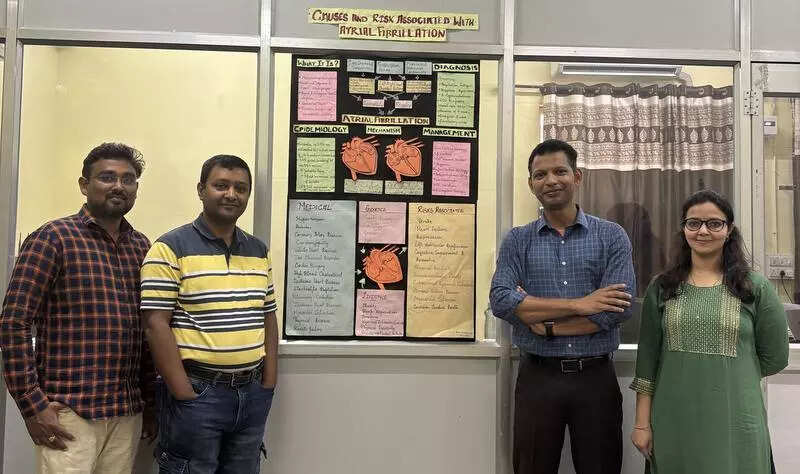NIT-R develops new atrial lead system for arrhythmia detection | Bhubaneswar News

Bhubaneswar/Rourkela: Researchers from NIT-Rourkela designed a novel lead placement system called the atrial lead system(ALS) using the electrocardiogram (ECG) machine and its electrodes to detect irregular heart rhythms, or arrhythmias, responsible for a large number of cardiac-related deaths around the world.Usually, doctors or healthcare workers use anECG machine connected with 12 electrodes to measure the electrical activity of the heart by placing the electrodes on different parts of the body. Lead wires are connected with the electrodes and the ECG machine.In an ECG, doctors check the ‘P-wave’, which reflects the electrical activity in the upper chambers of the heart. However, P-waves are often small and easily lost in background noise or obscured by stronger signals from other parts of the heart. As a result, detecting atrial arrhythmias can sometimes be difficult, particularly in busy clinical settings or with low-cost monitoring equipment, said the researchers. J Sivaraman, research lead and assistant professor, department of biotechnology and medical engineering, NIT-Rourkela, said lead placement involves positioning these electrodes to capture clear signals from the heart. Placing three leads and positioning the electrodes at the right place on the chest brought wonderful results in improving the accuracy of arrhythmia detection, he added. “The ALS uses a modified arrangement to improve how electrical activity from the atria is recorded. By strengthening these signals, especially the P-wave, the system helps improve the accuracy of arrhythmia detection, both by doctors and by computer-based diagnostic tools,” he added.Other researchers were N Bala Chakravarthy and Kunal Pal, along with research scholars Prasanna Venkatesh and Arya Bhardwaj from NIT-Rourkela, with clinical collaborations and validation provided by Dr R Pradeep Kumar, Institute of Cardiac Care, MIOT International, Chennai. Findings of this research were published in international journals, including Biomedical Signal Processing & Control, Medical Hypotheses, and Physical & Engineering Sciences in Medicine.The research team also filed a patent application for the atrial lead system.This new system helps in easily detecting subtle electrical signals from the upper chambers of the heart, which are often too indistinct to be seen clearly in regular ECGs. These signals play a key role in identifying abnormal heart rhythms that can lead to serious conditions such as atrial fibrillation, which can further lead to stroke, said Dr R Pradeep Kumar.Irregular heart rhythm in the heart’s upper chambers, known as atrial arrhythmias, are among the most common, especially in patients who were hospitalised. Identifying these arrhythmias in an early state can help doctors begin timely treatment and prevent complications, said Sivaraman.The ALS mechanism requires no change to the ECG machine itself. The innovation lies entirely in the way the leads are placed, which means the upgrade can be easily adopted in both public and private healthcare settings without additional cost, said the researchers.
















